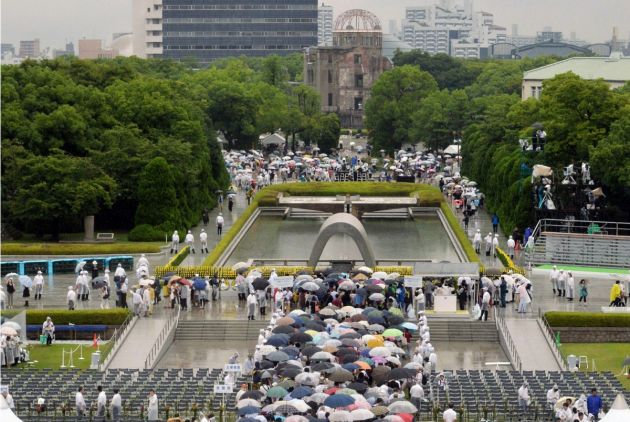Hiroshima and Nagasaki atomic blasts still echo 70 years on, says Red Cross

Seventy years after the atomic bombings of Hiroshima and Nagasaki, Japanese Red Cross Society hospitals are still treating thousands of survivors for long-term health effects.
Nearly two-thirds of deaths among those survivors are due to cancer, says the Red Cross.
"Even after so many decades, we continue to see the catastrophic health impact from the use of nuclear weapons on these two cities," said ICRC President Peter Maurer.
"What more compelling argument could there be for the complete elimination of nuclear weapons, especially as most of the bombs in the arsenals of nuclear armed states today are more powerful and destructive?"
With nearly 200,000 survivors still alive it is expected that many thousands will continue to need care for radiation related illnesses in the coming years, while the psychological impact of the bombings continues to haunt even those survivors not physically ill.
"This commemoration is a reminder of the indiscriminate humanitarian consequences of nuclear weapons," said Tadateru Konoé, the President of the International Federation of Red Cross and Red Crescent Societies.
He is representing the Movement at Peace Memorial Ceremonies in Hiroshima and Nagasaki and said, "It is a reminder that these consequences travel across space and time and that, once unleashed, they can never be contained."
HIROSHIMA AND NAGASAKI A-BOMB SURVIVORS
In the year last year alone, the Japanese Red Cross Hiroshima treated 4,657 survivors and Nagasaki Atomic Bomb Survivors Hospitals treated 6,030.
Church leaders from seven countries have embarked on a pilgrimage in early August to the two Japanese cities that were decimated by atomic bombs 70 years ago.
These church leaders represent members of the World Council of Churches from the United States, Germany, Japan, South Korea, Norway, the Netherlands and Pakistan, will be in Hiroshima on August 6, 1945 and Nagasaki three days later.
Those countries are currently making historic choices for or against outlawing nuclear weapons.
In Japan the delegates will meet with atomic bomb survivors, church members, religious leaders and government officials.
They will bring international calls for action home from the two cities. The key step will be to urge their governments to join a new inter-governmental pledge to "close the legal gap" and establish a formal ban on nuclear weapons.
This humanitarian initiative already has the support of 113 countries.
Bishop Mary Ann Swenson of the United Methodist Church in the United States, vice-moderator of the WCC Central Committee, is leading the delegation.
"We will be in Hiroshima and Nagasaki to remember the horror of the atomic bomb, and to affirm what ever-larger majorities of the United Nations General Assembly are saying today.
'It is in the interest of the very survival of humanity that nuclear weapons are never used again, under any circumstances'," says Swenson.
"This station on the WCC pilgrimage of justice and peace is a very important one," Swenson said. "As we gather in places devastated by the deadliest of weapons 70 years ago, we are aware that 40 governments still rely on nuclear weapons."
Nearly two-thirds (63 per cent) of atomic bomb survivor deaths in the hospital in Hiroshima and Nagasaki through March 2014 were attributed to cancers.
The primary types were lung cancer (20 per cent), stomach cancer (18 per cent), liver cancer (14 per cent), leukemia (8 per cent), intestinal cancer (7 per cent) and malignant lymphoma (6 per cent).
Over this period, more than half of all deaths at the Nagasaki Red Cross hospital (56 per cent) were due to cancer.
The Japanese Red Cross Society has run hospitals for atomic bomb survivors in Hiroshima since 1956 and in Nagasaki since 1969. The hospitals have together handled more than 2.5 million outpatient visits by atomic bomb survivors and more than 2.6 million admissions of survivors as inpatients.
The 70th commemoration of the atomic bombings comes just months after the failure of the Review Conference of the Treaty on the Non-Proliferation of Nuclear Weapons to agree on moves forward towards their elimination.
"Nine States possess nuclear arsenals and 31 other States are willing to have the United States use nuclear weapons on their behalf," Bishop Swenson said.
Nuclear weapons are in the news now due to the recent negotiations with the international community and Iran as well as threatening rhetoric in the Ukraine crisis, Swenson noted.
"We don't know where the next threat may erupt, or when a threat may become an actuality of destruction," she said.
"We invite Christians around the world to join us in prayer as we make this pilgrimage," she said.
"The 70th anniversary of the atomic bombings is a significant milestone," said Peter Prove, director of the WCC's Commission of the Churches on International Affairs.
Prove commented, "It is timely because most of the survivors of the 1945 attacks are now in their 80s. Their cries of 'never again' must still be heard.
"It is urgent because the nuclear powers are all modernizing their nuclear weapons instead of abolishing them as promised. It is also hopeful because a growing international majority is forming to ban nuclear weapons, and WCC member churches are involved."